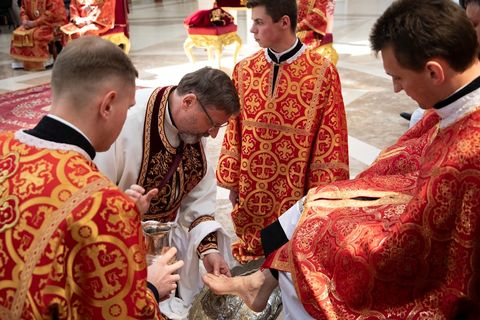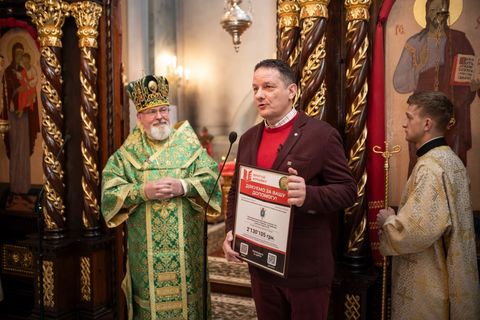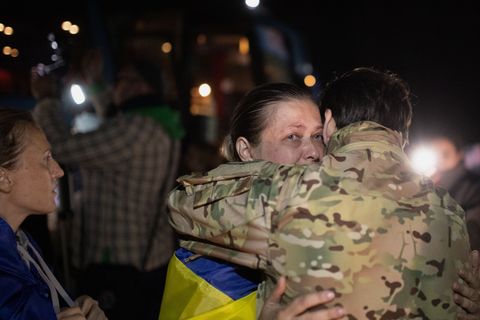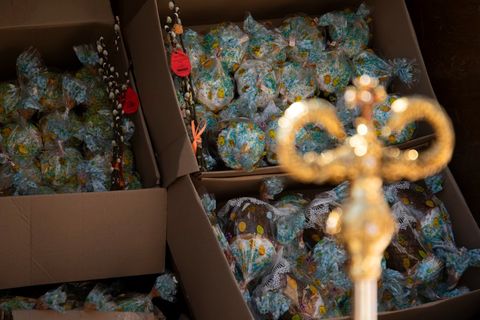Ten years of Russia’s War against Ukraine Recognized as Genocide: Head of the UGCC
Before the second anniversary of the full-scale invasion and the tenth anniversary of Russia’s war against Ukraine, the Pontifical Charitable Foundation “Aid to the Church in Need” (ACN International) hosted a press conference, “2014-2024: Ten Years of War in Ukraine”. The Father and Head of the UGCC, His Beatitude Sviatoslav, and the Apostolic Nuncio to Ukraine, Archbishop Visvaldas Kulbokas, spoke to about 70 journalists from around the world via video link from Kyiv.
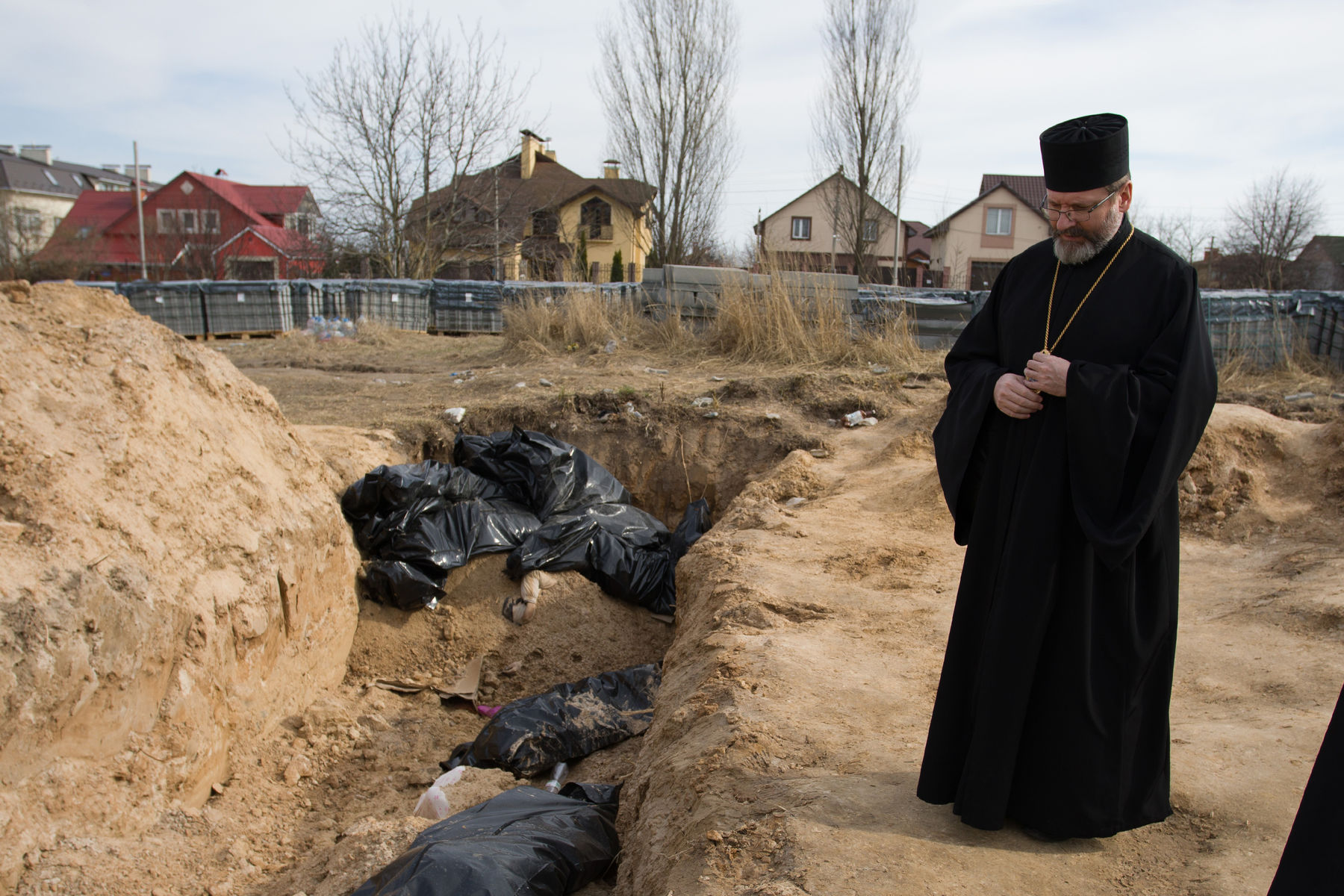
Head of the UGCC at the mass grave in Bucha, April 7, 2022
In the opening statement, the Executive President of Church in Need, Ms. Regina Lynch, pointed out: “With the rising number of conflicts and riots across the world at this time, there is a real danger that Ukraine could be forgotten as the world’s attention diverts from one crisis to another,” she said. “We at ACN are determined to prevent this from happening.”
Voice of the Church from Ukraine
“I have a couple of good news from Ukraine,” His Beatitude Sviatoslav began, “The first is that we are alive, and as a Church, we are trying to bring hope to our people amidst suffering, destruction, and death. The second is that international humanitarian solidarity is active and enables us to save so many lives in Ukraine.”
The Head of the UGCC expressed his gratitude to friends from the “Aid to the Church in Need” fund for their visits to Ukraine and comprehensive support, as well as for emphasizing that the war in Ukraine began ten years ago with the annexation of Crimea and the occupation of Donbas by Russia.
The Apostolic Nuncio emphasized that this war is “not just a theory.” He said that he often meets with families of prisoners, both military and civilian. Some have been in captivity for seven years, and some more. “How often we remember the two captured priests from Berdiansk — Ivan Levytsky and Bohdan Geleta! We do not know where they are or their situation,” added the archbishop.
The nuncio also emphasized that in Kharkiv, Zaporizhzhia, Dnipro, and Kherson regions, “almost all schools have been closed for four years”: first because of the pandemic, now because of the war. Children are studying online, and in some places, kindergartens and schools are being equipped in underground premises.
In such circumstances, the Church in Ukraine “acts as a single body,” said Monsignor Visvaldas Kulbokas, emphasizing that the people are central to its ministry in the war.
Children of war
Answering journalists’ questions about the mission of Pope Francis’ special envoy, Cardinal Matteo Zuppi, His Beatitude Sviatoslav noted that one of its priorities is the return of abducted Ukrainian children. He emphasized that “children in Ukraine are the most vulnerable part” of Ukrainian society, which has been severely traumatized, especially during the last two years of Russian aggression. More than 500 children have been officially recognized as dead, more than 1,200 have been injured, and many of them have lost limbs and need prosthetics.
“If we consolidate our efforts at various levels — diplomatic, humanitarian, even with the help of journalists from different countries — more Ukrainian children will be saved and return to their homes from Russia,” the Patriarch expressed hope.
UGCC in the occupied territories
Today, “there is not a single Catholic priest in the Russian-occupied territory,” said His Beatitude Sviatoslav. Moreover, a few weeks ago in Donetsk, where people gathered for prayer even without a priest, the occupiers closed the church. In the occupied part of Zaporizhzhia last year, the leader of the occupation authorities banned the activities of the UGCC and confiscated church property.
“It is becoming increasingly challenging for our people to practice their faith,” stated the Head of the Church.
War crimes must be condemned
The Head of the UGCC cautioned against Russia’s ten-year war against Ukraine, which aims to “destroy the existence of an entire nation.”
“We can testify that what is happening now in Ukraine is genocide,” said the Patriarch. “The state authorities [of Russia — ed.] decided to eliminate the existence of an entire nation. In Ukraine, people are being killed for being Ukrainians.”
His Beatitude Sviatoslav emphasized the importance of recognizing Russia’s war crimes in Ukraine. He thanked those organizations that come to Ukraine to investigate them.
“Condemning these war crimes is of the utmost importance. If we do not, they will persist and affect other nations and other parts of the world. Recognizing such atrocities as genocide means stopping them,” stated the Patriarch. “We, Ukrainians, need to be heard so that the world can see our pain and the aggressor can be stopped.”
Do you have any doubt?
His Beatitude Sviatoslav invited those who have doubts about the scale of Russia’s atrocities in Ukraine to “come and see.”
“Visit the people who are wounded or the families of the victims,” he said. “Come and see, come and touch the human wounds.”
New modes of pastoral care
According to the Head of the UGCC, in times of war, the Church is looking for new ways of pastoral care, including for people “who are grieving, who are in distress, and those who have lost their dearest family members.” His Beatitude Sviatoslav called it “the pastoral care of grief.”
“The future of Ukraine, the future of the Church, relies on how we can respond to this dire need of people in Ukraine to overcome the trauma of war,” he said.
“The Ukrainian family is subjected to constant torture today,” he emphasized, adding that in 2023, more than 180 thousand marriages and about 120 thousand divorces were registered in Ukraine. “This is the highest number of divorces in the history of independent Ukraine… And the greatest pastoral challenge for me, for our priests, for the Church,” the Primate stated.
What help do Ukrainians need today?
His Beatitude Sviatoslav noted that about 7 million Ukrainians are “facing a food crisis” as the war continues, and the “first euphoria” of humanitarian aid from a number of organizations has diminished.
Apart from food, people need housing. According to the Head of the UGCC, parishes in the East, South, and Center of Ukraine play a central role in receiving and accommodating internally displaced persons who “try to settle in the nearest relatively peaceful city.”
At the same time, the Ukrainian Greek Catholic Church is working to refresh the training of clergy and monastics to provide “psychological, physical, and spiritual support” to the population. The Patriarch added that teachers, volunteers, and other professionals also expressed interest in such training.
His Beatitude Sviatoslav also spoke about the rehabilitation centers that are currently underway in Ukraine, such as Unbroken in Lviv, where young Ukrainians receive rehabilitation and prosthetics. He remarked that there is an increasing demand for more centers of this kind.
Reference
The Pontifical Charitable Foundation “Aid to the Church in Need” (ACN International) provides assistance to persecuted churches in more than 145 countries. In Ukraine, it cooperates with the Ukrainian Greek Catholic and Roman Catholic Churches. Founded in 1947 to support victims of World War II, the organization implements more than 5,000 projects a year.
Since Russia launched a full-scale attack on Ukraine on February 24, 2022, ACN has provided more than $15 million in aid to clergy, monastics, and seminarians, supported initiatives aimed at healing the wounds of war and helping refugees, and more.
The UGCC Department for Information